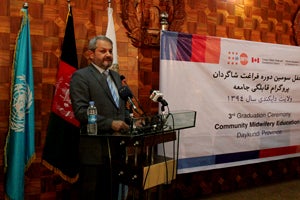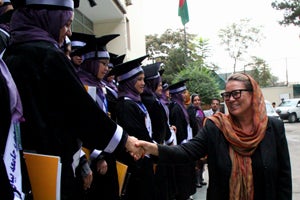Kabul, 21 September 2015 - After completing more than two years of specialized training, 36 Community Midwifery Education (CME) students proudly graduated today at the Ministry of Public Health. This is the third round of students from Daikundi graduating as community midwives from the CME School.
The graduation was attended by the Minister of Public Health, H.E. Dr Ferozedin Feroz, the Governor of Daikundi, Ms. Massouma Moradi, the Ambassador of Canada, H.E. Ms. Deborah Lyons, and the United Nations Population Fund, UNFPA Representative, Dr Annette Sachs Robertson.
"Afghanistan has had remarkable achievements over the last 13 years: The maternal mortality ratio has decreased fourfold since 2002, the infant mortality rate has dropped to 77 from 165 and the child mortality rate has decreased from 257 to 97 in the same period," said Dr Feroz. "However, there is still a long way to go to overcome many obstacles. That is, pockets of populations still don't have access to essential health services, especially in very remote and hard-to-reach areas like Daikundi."


While maternal mortality has decreased in Afghanistan, still every two hours a woman dies from pregnancy or birth-related complications. Skilled birth attendants play an essential role in preventing these deaths. Although around 4,600 women are currently working as midwives in Afghanistan, compared to 467 in 2002, more investment is required to meet the estimated need in the future.
According to Dr Sachs Robertson, the graduates from the Community Midwifery Education School are contributing to that need. "You represent a new generation of young women taking an active role to help others and support two of the most vulnerable groups in our society: women and children", said UNFPA Representative during her remarks at the graduation ceremony. "In total, 58 Family Health Houses will be functioning by 2016 and everyone living in the most remote areas of Daikundi should have access to essential maternal and child health care services."
The community midwives graduated today will move to Daikundi to be in charge of a Family Health House, a community-based health clinic serving 1,500-4,000 people in the most remote areas of the province. The Family Health Houses are intended as sustainable community-led initiatives, where candidates are nominated and supported by residents, who also bear a third of the costs.


The CME is part of the project "Improving Reproductive, Maternal, Child and Newborn Health Care and Promoting Women's Empowerment in Daikundi" financially supported by the Government of Canada in Daikundi since 2013.
As part of the project, the community, families, shuras and elders select students in their villages to be part of the Community Midwifery Education programme. Once selected, the future midwife enrolls in a two-year education programme complemented by a two-month period where she learns how to manage a clinic.
Since 2009, the Ministry of Public Health and UNFPA have been working to improve the health and wellbeing of communities living in the underserved areas of the country.
The Family Health Houses model has proven to be highly successful in reaching communities who don't have access to the Basic Package of Health Services of Afghanistan. UNFPA has opened 80 Family Health Houses to date in Bamiyan, Daikundi and Faryab provinces and nine mobile support teams are operational, including in Herat and Badakshan.
Materials:
Press Release: [English] [Dari]
About UNFPA:
UNFPA is the lead UN agency for delivering a world where every pregnancy is wanted, every birth is safe, and every young person's potential is fulfilled.

